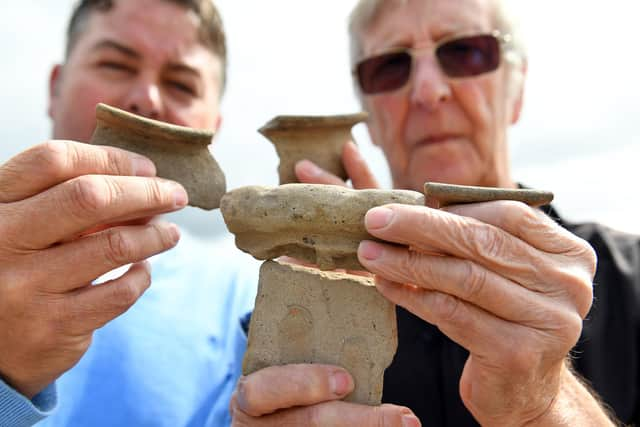Eighteen treasure discoveries made in Portsmouth last year - here's how to get started as a treasure hunter
and live on Freeview channel 276
Statistics released by Radar AI show that 18 treasure finds were made in the Portsmouth area last year, among more than 1,000 discoveries across England and Wales.
Treasure – defined as discoveries that are more than 300 years old, such as coins or artefacts – are presented to the Portsmouth and South East Hampshire Coroner’s Court, which holds treasure inquests.
Advertisement
Hide AdAdvertisement
Hide AdIf the court deems it to be a treasure, local and national museums are given an opportunity to acquire the discovery, with financial reimbursement for the finder.


Over the past three years, 47 discoveries have been made in the region.
There were 380 inquests concluded last year, with more than 90 per cent returning a verdict of treasure.
Ian Richardson, treasure registrar at the British Museum, said: ‘The purpose of the Treasure Act is to enable important archaeological objects to be acquired by museums, for the benefit of all.
Advertisement
Hide AdAdvertisement
Hide Ad‘It is pleasing to see local museums interested in acquiring a number of these finds if they are declared treasure.’
Last year, three Waterlooville residents Lee McGowan, Michael Poole and Peter Beasley claimed to have discovered Roman and Celtic remains at Old Down in the East Meon Valley.
Mr Beasley has a history of archaeological discoveries. In 2010 he sold a solid gold Roman pendant for £30,000 and in 1996 he uncovered a collection of Roman coins which were sold to the British Museum for £103,000. More recently, on March 13, 2016, Mr Beasley discovered a coin depicting two horses which the British Museum dated as between 50BC to 30BC.
If you discover something that could be treasure, there are set procedures to follow.
Advertisement
Hide AdAdvertisement
Hide AdYou must report your finding to the coroner within two weeks, so the court can hold an inquest to decide who should get the to keep it.
Failure to do so can result in an unlimited fine or up to three months in prison.
A message from the Editor
Thank you for reading this story on portsmouth.co.uk. While I have your attention, I also have an important request to make of you.
With the coronavirus lockdown having a major impact on many of our advertisers - and consequently the revenue we receive - we are more reliant than ever on you taking out a digital subscription.
Subscribe to portsmouth.co.uk and enjoy unlimited access to local news and information online and on our app. With a digital subscription, you can read more than 5 articles, see fewer ads, enjoy faster load times, and get access to exclusive newsletters and content. Visit our Subscription page now to sign up.
Our journalism costs money and we rely on advertising, print and digital revenues to help to support them. By supporting us, we are able to support you in providing trusted, fact-checked content for this website.
Comment Guidelines
National World encourages reader discussion on our stories. User feedback, insights and back-and-forth exchanges add a rich layer of context to reporting. Please review our Community Guidelines before commenting.